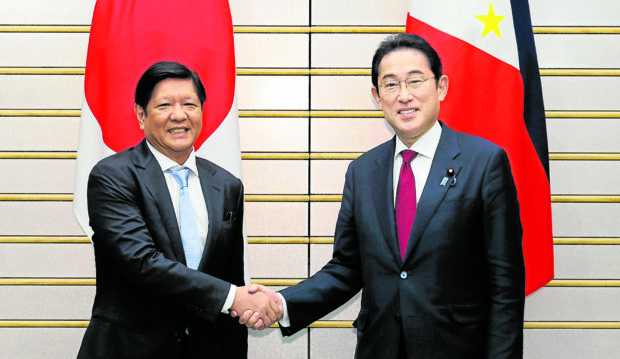Shared security concerns top Marcos-Kishida agenda

President Ferdinand “Bongbong” Marcos Jr. and Japan Prime Minister Kishida Fumio
Maritime tensions in the West Philippine Sea and other regional security challenges will be high on the agenda during the bilateral meeting of President Marcos and Japanese Prime Minister Fumio Kishida on Friday, according to Malacañang.
The leaders will exchange views on major issues affecting the region and the world, as well as the economic and cultural ties between the two countries, Presidential Communications Secretary Cheloy Velicaria Garafil said on Thursday.
“Both leaders are expected to discuss the two countries’ multifaceted and dynamic cooperation on political and security cooperation and economic and people-to-people relations,” Garafil said, quoting a statement from the Department of Foreign Affairs.
Marcos and Kishida are also expected to talk about Japan’s official development assistance (ODA) to the Philippines, of which Tokyo has been the biggest contributor.
During their meeting, the two leaders will also discuss negotiations for a Reciprocal Access Agreement (RAA), a bilateral defense and security pact that Japan has forged with its allies involving shared military training and operations and larger joint exercises.
Article continues after this advertisementJapan has an RAA with Australia and the United Kingdom and is eyeing one with France.
Article continues after this advertisementSenate President Juan Miguel Zubiri earlier mentioned talks on a possible RAA between Manila and Tokyo as a key topic to discuss with Kishida. On Saturday, the Japanese leader will address a special joint session of Congress.
Tokyo has supported Manila’s claims in the South China Sea and has called out Beijing for its aggression in the disputed waters.
Tour of PCG vessel
After Kishida’s speech in Congress on Saturday morning, the Japanese leader will tour a Japan-built patrol ship of the Philippine Coast Guard (PCG) in the afternoon as part of his two-day official visit.
The PCG will welcome Kishida aboard the BRP Teresa Magbanua (MRRV-9701) at South Harbor, according to a media advisory issued by the PCG.
The Japanese leader will also visit the PCG’s main headquarters at the Port Area in Manila.
The 97-meter BRP Teresa Magbanua is one of the two ships built by Japan’s Mitsubishi Building Co. that was commissioned into service last year through an ODA by the Japan International Cooperation Agency (Jica) for P7 billion.
Tokyo had earlier built ten 44-meter multirole response vessels worth P8.8 billion through Jica’s assistance to bolster Manila’s capabilities to patrol the West Philippine Sea amid its territorial disputes with Beijing. The ships were delivered in batches from 2016 to 2018.
Kishida is also expected to announce the transfer of defense equipment through its new official security assistance program, which was designed to boost the military capabilities of partner countries, according to Japanese media reports.
Japan Coast Guard commandant Adm. Shohei Ishii is also expected to meet PCG commandant Adm. Ronnie Gil Gavan on Saturday to discuss the current regional maritime security situation and reaffirm the partnership in capability development and personnel exchange between the two coast guards, the PCG said.
Repeated incursions
Both the Philippines and Japan share security challenges in the South and East China Seas.
Japan has expressed concern over China’s repeated incursions in the Senkaku Islands in the East China Sea, which is under Tokyo’s jurisdiction but which Beijing claims as part of its territory.
In its national security strategy released last year, Japan said its security environment “faces the severest and most complicated national security environment since the end of the war” being on the front lines of activities of Russia, North Korea and China.
Kishida’s visit to Manila comes on the heels of another incident when another Chinese ship shadowed the Philippine Navy corvette BRP Conrado Yap (PS-39) at Panatag Shoal in the West Philippine Sea, or waters within the Philippines’ 370-kilometer exclusive economic zone (EEZ).
On Oct. 22, a China Coast Guard ship making “dangerous blocking maneuvers” collided with one of two boats contracted by the Armed Forces of the Philippines and a PCG vessel on a rotation and resupply mission to Filipino troops stationed on Ayungin Shoal, or Second Thomas Shoal.
At a Bagong Pilipinas Ngayon briefing, AFP spokesperson Col. Medel Aguilar said China should stop its illegal activities within Manila’s EEZ.
“They should not be there and they should not harass our fishermen. They should stop all their illegal activities there,” Aguilar said.
For comprehensive coverage, in-depth analysis, visit our special page for West Philippine Sea updates. Stay informed with articles, videos, and expert opinions.